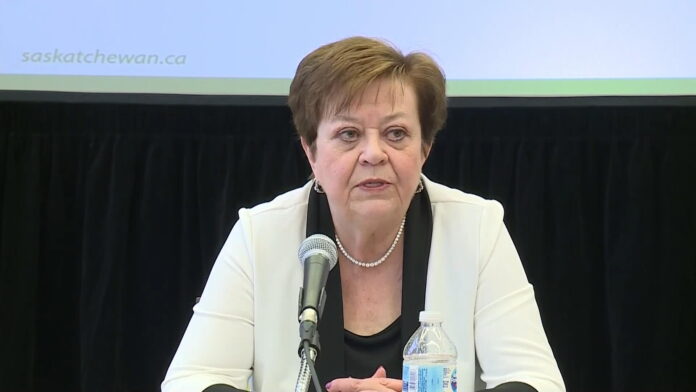On Tuesday, the provincial government made a number of announcements on the state of Saskatchewan’s economy and an affordability plan heading into the fall.
Through the first quarter, Saskatchewan is expecting a surplus of $1.04 billion for 2022-23. It’s a $1.51-billion improvement from the announced budget, which they claim is largely due to higher revenue from non-renewable resources.
“That means we can balance the budget, pay down debt and help Saskatchewan residents with the rising cost of living,” Deputy Premier and Finance Minister Donna Harpauer said Tuesday as she released the first quarter financial update. “That’s growth that works for everyone.”
As a result of the surplus, Harpauer has also announced a four-point affordability plan, to help address rising costs due to inflation and reduce the province’s debt.
“Strong resource prices have meant higher provincial revenues, and that’s good news, but it also means the cost of almost everything you buy has gone up,” Harpauer said.
“Saskatchewan people own the resources. Saskatchewan people should benefit when resource prices are high. That’s why we’re going to use higher resource revenues to help address rising costs and to retire up to $1 billion of the province’s debt.”
Point one comes in the form of the Saskatchewan Affordability Tax Credit payment. All Saskatchewan residents aged 18 and older as of Dec. 31, 2022, and who have filed a 2021 tax return as a resident of Saskatchewan will receive a $500 Saskatchewan Affordability Tax Credit cheque this fall.
Point two of the plan is the removal of fitness and gym memberships and some recreational activities from the planned October PST expansion on admissions, entertainment and recreation.
Trending Stories
‘I was in shock:’ Young Alberta golfer drains 2 holes-in-one at club championship
What would you do with $5,000? Here’s what Canadians said amid high inflation
PST will not be charged to residents under 18 years of age participating in recreational activities including golf, curling, hockey, tennis, basketball and similar formal sporting activities where the individual participates in a league or service where a round, game or match are completed.
However, for residents over 18, these activities will be taxable.
PST will not be applied to fitness classes or personal training and other fitness activities offered through municipal recreational facilities. PST will not be applied to arts, cultural and sports programming or membership fees like gymnastics fees, art classes, or acting classes, for example.
PST will be applied to ticket admissions to sporting events, concerts, trade shows, fairs, rodeos, movie theatres, professional water parks and entertainment admissions like escape rooms, batting cages and arcades.
This change will reduce PST revenue this year by an estimated $3 million.
Point three of the plan extends the small business tax rate reduction, at 0 per cent retroactive to July 1, 2022 and delaying the restoration of the rate to 2.0 per cent to July 1, 2024.
“It will save small businesses $93.1 million over the next three years, on average $3,000 for each small business,” a press release from the provincial government reads. “There are approximately 31,000 small businesses in Saskatchewan.”
The final point of the affordability plan is the retirement of up to $1 billion in operating debt.
Debt is now forecast to be $1.7 billion lower by fiscal year-end than projected at budget, the province’s projected surplus provides the ability to retire up to $1 billion in debt, and the province no longer needs to borrow for operations due to the improved financial position.
“Helping Saskatchewan people through a time of higher costs, as well as taking the prudent measure of retiring debt, strikes the right balance and helps our province move forward,” Harpauer said.
More to come…
COVID-19: Saskatchewan reports 1,524 new cases, 27 new deaths



